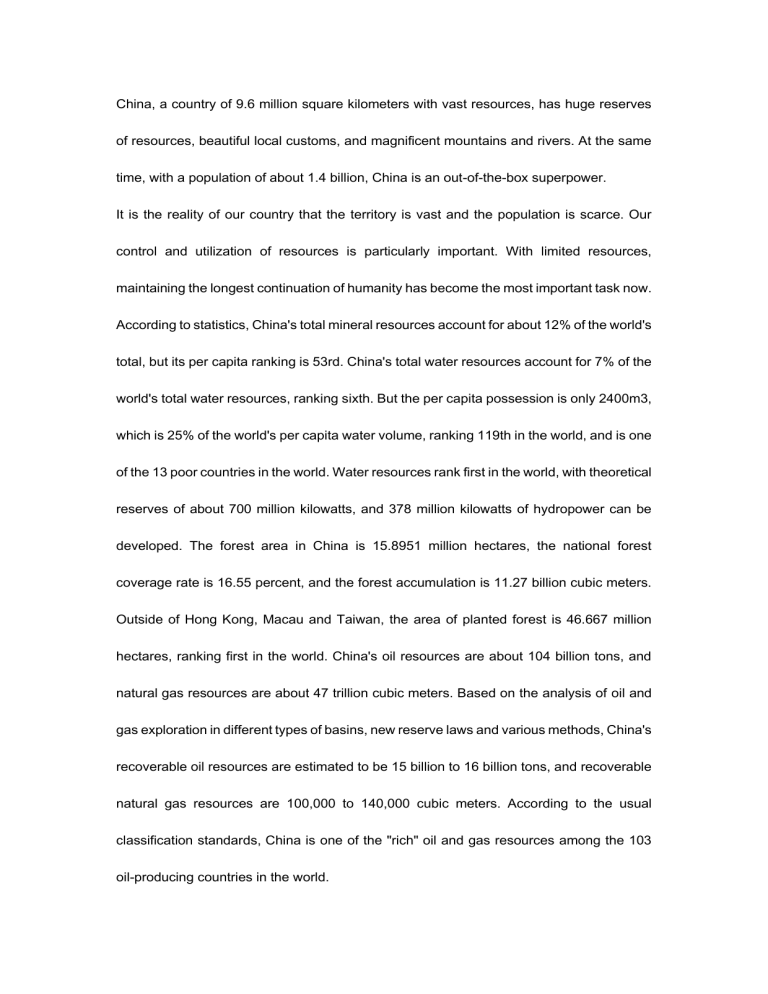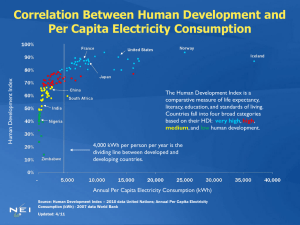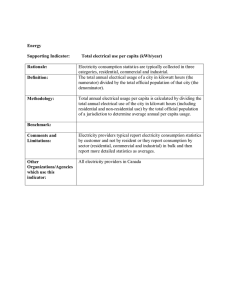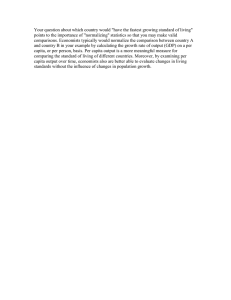
China, a country of 9.6 million square kilometers with vast resources, has huge reserves of resources, beautiful local customs, and magnificent mountains and rivers. At the same time, with a population of about 1.4 billion, China is an out-of-the-box superpower. It is the reality of our country that the territory is vast and the population is scarce. Our control and utilization of resources is particularly important. With limited resources, maintaining the longest continuation of humanity has become the most important task now. According to statistics, China's total mineral resources account for about 12% of the world's total, but its per capita ranking is 53rd. China's total water resources account for 7% of the world's total water resources, ranking sixth. But the per capita possession is only 2400m3, which is 25% of the world's per capita water volume, ranking 119th in the world, and is one of the 13 poor countries in the world. Water resources rank first in the world, with theoretical reserves of about 700 million kilowatts, and 378 million kilowatts of hydropower can be developed. The forest area in China is 15.8951 million hectares, the national forest coverage rate is 16.55 percent, and the forest accumulation is 11.27 billion cubic meters. Outside of Hong Kong, Macau and Taiwan, the area of planted forest is 46.667 million hectares, ranking first in the world. China's oil resources are about 104 billion tons, and natural gas resources are about 47 trillion cubic meters. Based on the analysis of oil and gas exploration in different types of basins, new reserve laws and various methods, China's recoverable oil resources are estimated to be 15 billion to 16 billion tons, and recoverable natural gas resources are 100,000 to 140,000 cubic meters. According to the usual classification standards, China is one of the "rich" oil and gas resources among the 103 oil-producing countries in the world. China's coal carbon reserves rank first in the world, with recoverable reserves of 114.5 billion tons, accounting for 11.60% of world reserves. China's total coal resources are 5.6 trillion tons, of which the proven reserves are 1 trillion tons, accounting for 11% of the world's total reserves. If the world burns only coal, China's coal reserves can be burned by people around the world for about 100 years. China's total freshwater resources are 2.8 trillion cubic meters, ranking sixth in the world, but the per capita water volume is only 25% of the world's per capita share, ranking 88th in the world. The country's forest area is 158.941 million hectares, ranking fifth in the world, with a forest coverage rate of 16.55%, which is only equivalent to 61.3% of the world's forest coverage rate. The forest volume is 11.27 billion cubic meters, ranking seventh The area of planted forests in the country (excluding Taiwan Province) is 46.667 million hectares with a cumulative volume of 1.01 billion cubic meters. The area of planted forests ranks first in the world. The forest area per capita in the country is equivalent to 21.3% of the world's per capita possession, and the forest accumulation per capita is only 1/8 of the world's per capita accumulation. China's oil resources are about 80 billion tons. Proved oil reserves account for about 20% of resources, about 3 billion tons. China's total conventional recoverable oil resources are 11.49 billion tons, ranking 9th in the world, and its per capita possession is only 10 tons, ranking 41st in the world. At present, the remaining recoverable reserves have stagnated year after year. In 1994, the “reserve-production ratio” was 22.2, and in 1995 the reserveproduction ratio dropped to 22, far lower than the world average of 46. Currently, oil accounts for only 2.4% of the world's total reserves, and natural gas accounts for only 1.2%. China has a large population and low per capita arable land. By the end of 2003, the total cultivated land resources was 1.851 billion mu, ranking fourth in the world, but the per capita cultivated land area was only 1.43 mu, less than 40% of the world average, and it is still decreasing at a rate of about 1.3 million hectares per year. Among more than 2,000 counties (cities), there are currently more than 600 counties (cities) with a per capita arable land area of less than 0.8 mu per capita arable land warning line recognized in the world. With such a severe per capita resource status, we are getting faster and faster on the road of saving resources and protecting the environment. The carriage of the times is moving forward rapidly, and the pace of environmental protection has never stopped. Since the 18th CPC National Congress, the CPC Central Committee has focused more on environmental protection and resource conservation. It has repeatedly emphasized related work, led new actions such as CD-ROM operations, and supply-side structural reforms. General Secretary Xi Jinping also proposed that the environment is the people's livelihood, and green water and green mountains are the action plans of Jinshan and Yinshan. The development and utilization of resources must not only support contemporary people to live a happy life, but also leave a foundation for survival for future generations. In order to achieve the great goal of national rejuvenation, for sustainable development, and to realize the great Chinese dream. We have been in action. We all know that ten years of trees and centuries of tree-building. To establish a good sense of conservation, we must start from the school days and from the baby. In order to deeply implement the central government's spirit of hard work, frugality, and opposition to extravagance and waste, strengthen the education of the concept of ecological civilization and the national conditions of resources and environment, integrate energy conservation, environmental protection, and ecological civilization into the socialist core value system and education and teaching system, and vigorously promote the construction of economical campuses. Guide students to establish a consciousness of "saving glory, shameful waste" and develop good behavior habits. It is decided to start three in-depth activities in schools and kindergartens at all levels and across the country from the beginning of this fall. Three sections as the name implies are water, electricity, and food. It fits our theme very well. Taking the precious opportunity of the Mao Ji practice class, we formed a group to investigate the situation of electricity and water conservation in the school. Our group was divided into three groups to conduct a group survey on water, electricity and food. The main methods of investigation are field visits, taking photos, and interviewing relevant parties. With the careful preparation and planning of the group, we started our campus investigation. Our main survey method is to interview classmates, teachers, and heads of catering companies around us. Take photos or videos of related content. The questionnaire was used as the main interview method, and the face-to-face interview was used as the auxiliary method. Under the arrangement of our team leader, we conducted several investigations in the fifth week, the seventh week, and the ninth week. In saving resources for dormitory life, we found that students have a strong sense of conservation. For example: Turn off the air conditioner when no one is in the dormitory, and adjust the temperature of the air conditioner to 26 degrees, and turn off the shower and faucet in time when taking a bath and washing. Some students receive sewage to wash the toilet after taking a bath. People go to turn off the lights and so on. However, we also found that the showers in many bedrooms have a serious problem of water leakage. In the bath, a lot of water flows from the connection of the pipes to waste, and there is also a leakage in some bedrooms of the faucet, which wastes a lot of water. After investigation, we saw the Internet of Things power-saving socket installed by the school for bedroom air conditioners. It intelligently adjusts the temperature of the air conditioner according to the indoor temperature, so that the room can be both cool and pleasant and save energy. At the same time, all of our school's water heaters have been replaced with solar water heaters, which can save 70% of electricity. Based on a dormitory that uses 20 liters of hot water a night, the annual electricity cost savings are about 200 yuan, which not only saves electricity costs, but also saves a lot of money. energy. In daily life, we interviewed several students randomly. During the interview, we found that many students took a bath time of 15-20 minutes while singing while taking a bath, and even watching TV shows while taking a bath. Behaviour during the period. We believe that this behavior should be eliminated. When observing flush toilets, we saw that the water reservoirs in many dormitories were leaking. They were in a state of water storage all day long, and a large amount of water was wasted virtually. The high-power appliances in the dormitory are basically eliminated, but we see that many drinking fountains in the dormitory are still boiling water in the absence of anyone. Some classmates' routers, monitors, desk lamps, and other electrical appliances are always in standby. According to information, these electrical appliances that consume standby for a long time also consume considerable power. When interviewing the catering business in the school, we found that the business's awareness of water and electricity is relatively strong, and the sanitary conditions are also good, which may be related to the strict requirements of our school management. In terms of water and electricity saving in dormitory, we have put forward the following practices and suggestions: reduce bath time as much as possible, turn off the water in time, flush the toilet with sewage, do not open the faucet too much during washing, and minimize the time of faucet running. Warranty leaking water tanks in time, so that all hidden dangers that may cause water waste are nowhere to be seen. In terms of power saving, people should turn off the lights and adjust the temperature to 26 degrees when using air conditioners. Turn off the air conditioner in time. Use plug-in board switches for your desktop appliances to turn them off to reduce unseen power consumption. In the third collective interview, we came to the Xuesan canteen to conduct on-site inspections of the canteen's diet. We selected three points in the morning, middle, and evening for observation and recording. Or fast food like buns. When we observed at noon, we found that there were very few leftovers in the Longyuan cafeteria, and we could put plates and cutlery on the bran counter. With the enthusiasm of the people and the leadership of the Party Central Committee, the CD-ROM operation is in full swing. The purpose of the CD-ROM operation is: not more restaurants, less canteens, and less kitchen. Cultivate the habit of cherishing food in your life and prudently saving against waste, not just an action. Not just eating and packaging in the restaurant, but ordering on demand, cooking on demand in the cafeteria, and cooking on demand at home. The ongoing "CDROM operation" attempts to remind and warn people that hunger is not far from us, and even today, cherishing food and saving food is one of the ancient virtues to be observed. This is not only a saving of food, but also a promotion of traditional Chinese culture, a persistence that does not forget the original intention, and runs through the beautiful tradition of our Chinese blood. In the three group surveys, we not only observed the actual situation of saving water, electricity and food resources, but also improved the planning and communication capabilities of each of us, enhanced the cohesion of the team, and strengthened our communication skills. We have benefited a lot. We propose: from now on, be a caring person, save water and electricity everywhere in life, save food, and act as a CD. The benefits are in the contemporary, the achievements are in the past. Only from me, from now on, can we keep human beings alive. Realize the great rejuvenation of the Chinese nation.




